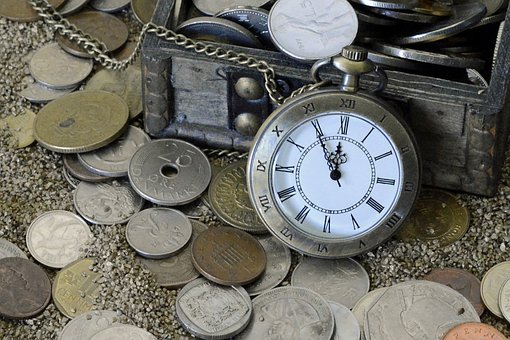
Time: 4 Strategies to Invest Wisely
“Better three hours too soon than a minute too late.”—William Shakespeare
“If only I had more time!” I’m sure you’ve said this often. In a sense, time is a universal leveler because the powerful and wealthy have no more of it than the poor and needy.
Furthermore, neither the rich nor the poor can accumulate time.
Time is the great equalizer and our greatest asset because once it’s gone, it’s gone.
And you can’t get it back.
You must learn to master your time and not be its slave.
We must “invest” our time wisely.
As Benjamin Franklin said: “Time is money.”
Four Strategies to Invest Time Wisely
In this article, I will share four strategies that have helped many people to invest their time wisely—to make the time count.
Strategy 1: Be Organized
Plan your day. Imagine that your day has just begun. You have a seemingly endless number of tasks before you. The thought of all these duties may cause you to dread the day. Where should you begin? By planning your day. Start by writing what is known as a To-Do list. Check off each item as completed. (Your smartphone is an easy way to create to-do lists and planning notes.)
Think ahead. Make the best use of your time by eliminating nonessential tasks, which do no more than consuming time and energy. Set priorities by numbering each item on your to-do list according to importance. Then to the extent possible, handle each activity in that order. (Again, you can put your smartphone to good use here.) Of course, there will be times when you may choose not to handle a matter in strict priority order. Your objective is to stay in control so that what you accomplish each day is by choice rather than by chance. Thinking ahead is an excellent way to increase your productivity.
Simplify your life. Learn to say no to things that are unimportant or that do little more than consume time. Communicating no, helps you to establish healthy boundaries and enables others to have clarity about what to expect. To say no also means you know your value and respect yourself enough to stand up for your beliefs. Too many activities and appointments can add needless stress and can rob you of joy.
Strategy 2: Avoid Time Stealers
procrastination. To procrastinate means to delay or postpone action. Procrastination is a thief of both time and productivity; you waste time that you could be investing in something meaningful. While not laziness, some refer to procrastination as a “fierce enemy.”
When you learn how to overcome procrastination, you will accomplish more in life. It is true that when you have to make critical decisions, researching and gathering relevant information and deliberating before moving forward is essential. However, do not allow procrastination to make you indecisive and paralyze you.
“While we waste our time hesitating and postponing, life is slipping away.”—Seneca
Perfectionism. No one is perfect. However, perfectionism has been linked to some eating disorders, such as anorexia and bulimia, but not, as suggested in some articles, to psychiatric problems such as depression, alcoholism, anxiety disorders, or phobias. (Source: WebMD.com)
Set high goals and enjoy the process of achieving them. But don’t beat yourself up and wallow in negative feelings when you don’t meet high expectations. Perfectionism means “refusal to accept any standard short of perfection.”—Oxford English Dictionary
Instead, learn to relax. Don’t despair. Consider that “almost perfect” is still a job well done. So, while high standards are commendable, concentrate on what is essential. Know when it is time to stop and move on to the next important task.
Strategy 3: Create Balance and Be Realistic
Balance work and recreation. Workaholics often deprive themselves of the joys of life. They have no time or energy left. Balance is needed.
- Disconnect for a few hours each day/night by turning off your phone and computer to give your brain a rest.
- Spend the extra time interacting with family and friends.
- Pay attention to your health and be more productive and happier when you get enough sleep.
- Get out in nature; go for a walk.
- Play. Have fun!
Set realistic goals. People are goal-oriented. A life without goals is pointless and goes nowhere. Therefore, be sure to have worthwhile goals to guide your use of time and energy. However, goals alone have little meaning. They have real sense only when actions accompany them.
Goals are time-savers. Have you noticed the number of people who squander their lives “hanging out?” Or engaging in leisurely pursuits. What is lacking in the lives of these people? Worthwhile goals.
Knowing what you want to do and planning to meet the goals you have set will help you make better use of your time.
Speaking of goals, Psychology Today noted, “One attitude that is important for adult happiness is a certainty that life has meaning and direction that one is progressing toward life goals.”
Strategy 4: Be Guided by Your Values
Consider your values. Your values enable you to gauge what is good, meaningful, and worthwhile. Good values help you set priorities in life and make the best use of your time by the hour and day by day. What is important to you?
Many people make love their principal value. We cannot be delighted and emotionally secure without love, especially within the family. Many people disregard that fact and give priority to gaining wealth or a career.
Often these pursuits result in unhappiness.
How much of your time is it worth?
Before you buy something, psychologist Charles Spezzano suggests converting monetary value into the time it would take you to earn that amount of money and then seeing if it’s still worth it.
What is important to you?
- Family
- Work
- Education
- Friends
- Community
- Spirituality
- Leisure
- Health
Be sure to set aside time to nurture yourself spiritually and emotionally.
The four strategies in this article will help you invest your time far more wisely than perhaps you’re doing today.
No other investment will give you the wisdom to make the most, not just of each day but of your life as a whole.
Why not begin today?
“Time is what we want most, but what we use worst.”—William Penn




